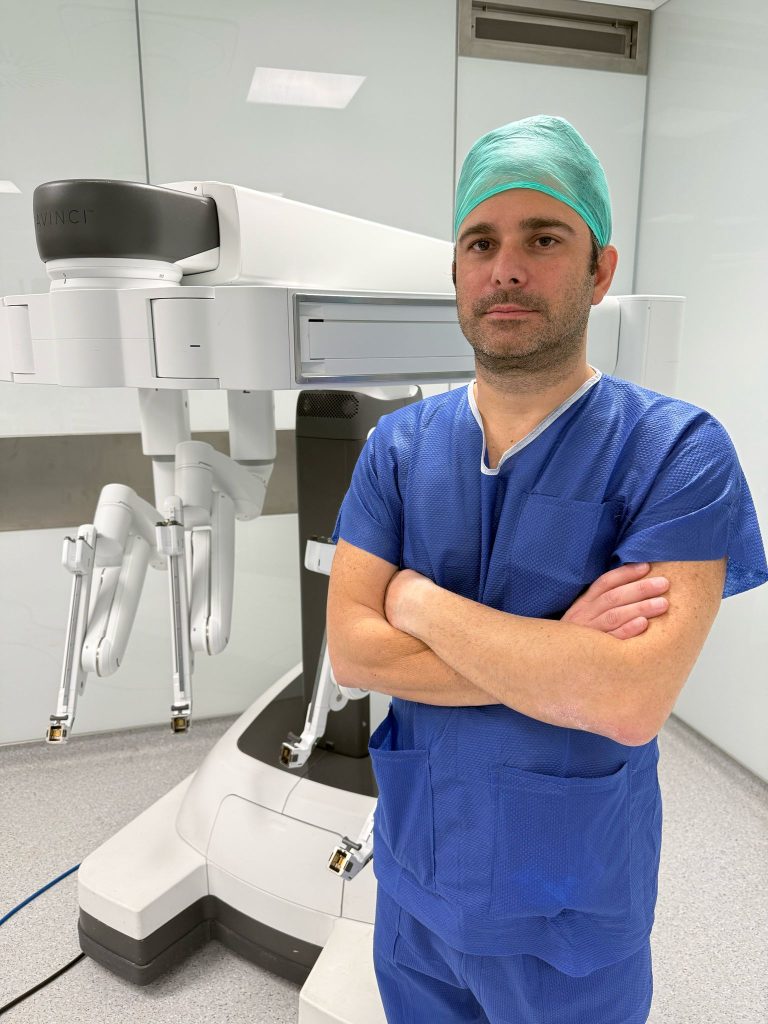Symptoms of Hiatal Hernia
The most common symptoms of hiatal hernia include:
- Frequent heartburn.
- Chest pain or burning sensation.
- Regurgitation of food or acidic liquids.
- Difficulty swallowing (dysphagia).
- Excessive belching or feeling of fullness.
Although some people may have a hiatal hernia without showing symptoms, others can experience significant discomfort that affects their quality of life.
Hiatal Hernia Treatment at Centro PAD
The treatment for hiatal hernia aims to relieve symptoms, prevent complications, and improve the patient’s quality of life. If lifestyle changes or medications are not enough to control the symptoms, surgery can be an effective option.
At Centro Pad, we offer an innovative and minimally invasive approach to treat this condition. Our specialists may use robotic surgery with the Da Vinci system, allowing us to perform highly precise procedures with less pain and faster recovery.
Non-surgical Treatment
In many cases, hiatal hernia symptoms can be managed with:
- Changes in diet and lifestyle.
- Medications to reduce stomach acid.
- Treatments to improve gastric emptying.
Surgical Treatment
When non-surgical treatments are not sufficient, laparoscopic or robotic surgery may be necessary. Surgical treatment involves returning the stomach to its normal position and, if needed, reinforcing the esophageal hiatus to prevent the stomach from sliding into the chest.

Robotic Surgery with the Da Vinci System for Hiatal Hernia
At Centro Pad, we have cutting-edge technology such as the Da Vinci robotic surgery system, which allows us to perform complex procedures with precision and minimal invasiveness. This technology offers 3D vision and enhanced accuracy, improving outcomes and reducing the risk of complications. Additionally, as a minimally invasive technique, robotic surgery reduces postoperative pain and speeds up patient recovery.
Advantages of Robotic Surgery in Hiatal Hernia Treatment
- Precision and control: Robotic tools enable more precise movements and a clear view of the problematic areas.
- Less pain: Small incisions reduce postoperative pain compared to open surgery.
- Fast recovery: Thanks to the minimally invasive technique, most patients can return to daily activities within a few days.
Minimally Invasive Techniques and Laparoscopic Surgery
Laparoscopic surgery is a minimally invasive technique used to treat hiatal hernia. This surgery is performed through small incisions, allowing the surgeon to access the affected area without the need for a large opening.
Who Can Undergo Treatment for Hiatal Hernia?
Treatments for hiatal hernia are recommended for patients experiencing severe or persistent symptoms, such as chronic heartburn or chest pain, that do not respond to medication or lifestyle changes. It is also advisable for those suffering from associated complications, such as Barrett’s esophagus or gastric ulcers.



